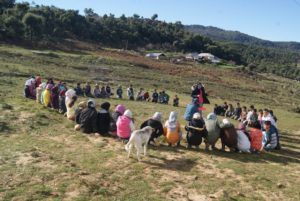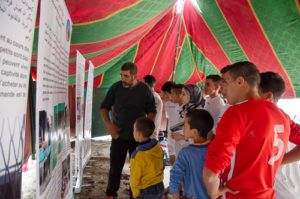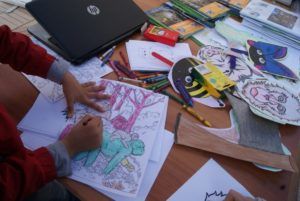Many of the solutions to helping protect some of our most endangered species involve working with local communities to raise awareness of the issues and solutions. This vital conservation tool is very different from much of the work researchers do but it has the rewards of watching people inspired by your work coming together to help save a species.
In this guest blog post Dr Sian Waters takes us to Morocco and the work she does to raise awareness of the illegal trade in Barbary macaque.
Barbary macaque pet trade
 The wildlife trade is of international concern and much attention has been focused on large mammals poached for their tusks, horns etc. for markets in the East. However, many people are unaware that we have a serious problem with illegal wildlife trade closer to Europe. Morocco in North Africa is a hub for smuggling wildlife to the EU including the focus of our conservation and awareness raising work, the endangered Barbary macaque. The macaque is protected by both national and international laws banning the trade in this species. However, there is a lack of general awareness about wildlife conservation and welfare issues among the Moroccan public and many are unaware that owning a pet macaque is illegal and could incur a heavy fine.
The wildlife trade is of international concern and much attention has been focused on large mammals poached for their tusks, horns etc. for markets in the East. However, many people are unaware that we have a serious problem with illegal wildlife trade closer to Europe. Morocco in North Africa is a hub for smuggling wildlife to the EU including the focus of our conservation and awareness raising work, the endangered Barbary macaque. The macaque is protected by both national and international laws banning the trade in this species. However, there is a lack of general awareness about wildlife conservation and welfare issues among the Moroccan public and many are unaware that owning a pet macaque is illegal and could incur a heavy fine.
Teacher training
 With the help of People’s Trust for Endangered Species we have produced a variety of awareness raising materials for use in Morocco. In our workshop, I am training teachers who work in a Women’s centre near the Moroccan city of Tétouan. My Moroccan assistant, Ahmed uses our education exhibition to deliver a message about the unique Barbary macaque. Many of the women are very impressed by the information that Barbary macaque males are the main infant caretakers in this species! They are also visibly upset to find out that the infants openly on sale in Morocco are stolen from their family groups in the Middle Atlas Mountains.
With the help of People’s Trust for Endangered Species we have produced a variety of awareness raising materials for use in Morocco. In our workshop, I am training teachers who work in a Women’s centre near the Moroccan city of Tétouan. My Moroccan assistant, Ahmed uses our education exhibition to deliver a message about the unique Barbary macaque. Many of the women are very impressed by the information that Barbary macaque males are the main infant caretakers in this species! They are also visibly upset to find out that the infants openly on sale in Morocco are stolen from their family groups in the Middle Atlas Mountains.
At the end of the workshop, we provide materials to the teachers which include a teacher’s pack full of ideas of activities for children featuring the macaque, a story book, posters and the script of a play about the experience of a young macaque taken from her family and sold as a pet. We are delighted to receive a photo later in the week of one of our newly trained teachers telling school children all about the macaque.
The successes
 Increasingly, the Barbary macaque has become the exotic pet of choice for the increasing Moroccan urban middle classes so training the trainers in this way enables us to disseminate our education materials increasing the outreach capacity in other cities. Since we began our awareness raising work, the Moroccan public has responded in their hundreds to report animals illegally for sale or being exploited as photo props. Their participation has resulted in the confiscation of many macaques, some of which have been suitable for us to release to wild groups.
Increasingly, the Barbary macaque has become the exotic pet of choice for the increasing Moroccan urban middle classes so training the trainers in this way enables us to disseminate our education materials increasing the outreach capacity in other cities. Since we began our awareness raising work, the Moroccan public has responded in their hundreds to report animals illegally for sale or being exploited as photo props. Their participation has resulted in the confiscation of many macaques, some of which have been suitable for us to release to wild groups.
